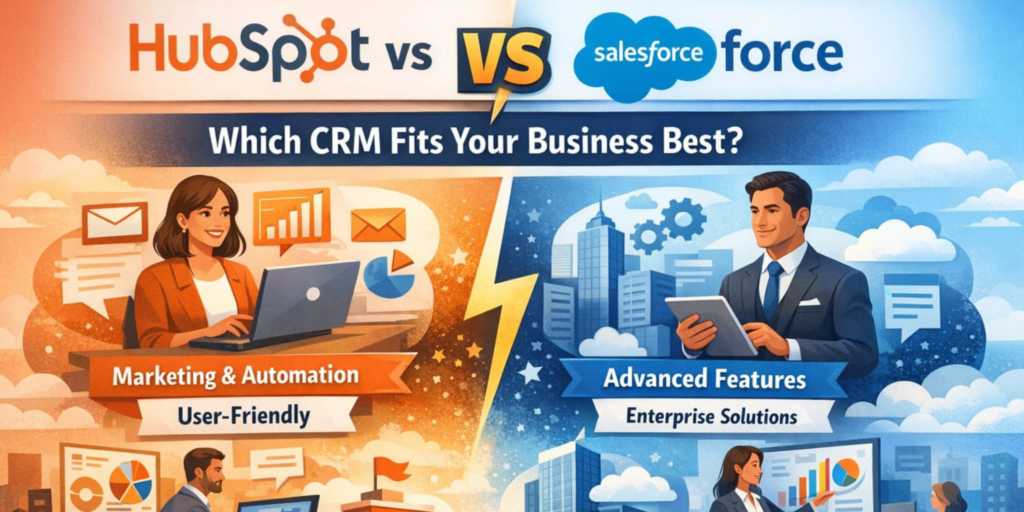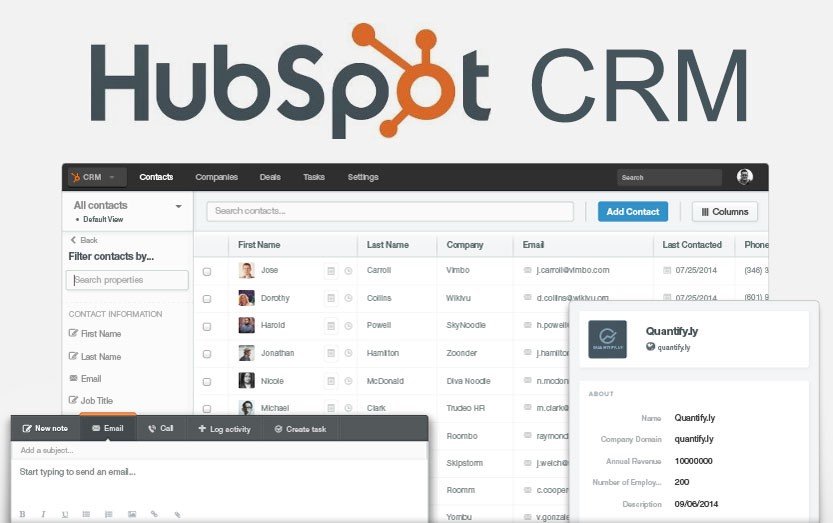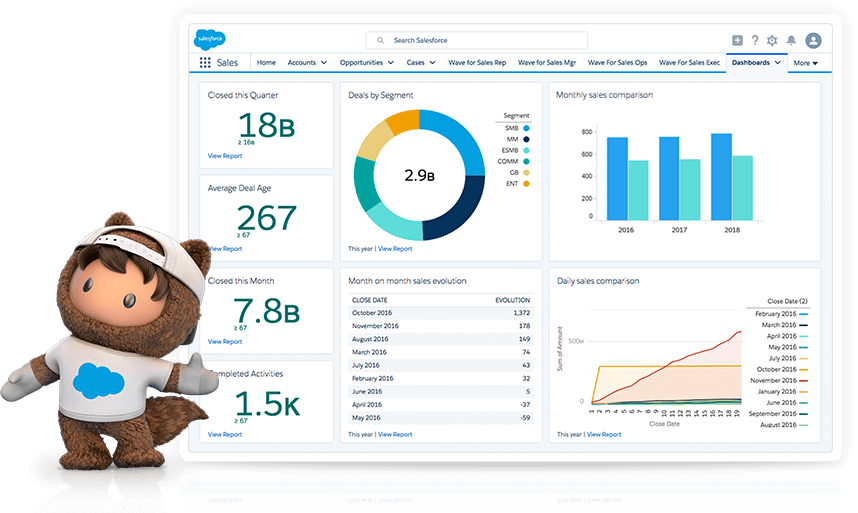In renowned industries, HubSpot and Salesforce are capable platforms that help businesses users organize projects, manage customer relationships, and automate marketing funnel across multiple teams. Both CRM platforms offer arrays of apps designed for productivity, acting as all-in-one digital work ecosystems where teams can align workflows for better efficiency.

Rather than trying to flip a coin when picking between options, it helps to test how each system’s strengths stack up to real needs, especially as companies grow and expect seamless integrations and strong app ecosystems. Trusted overviews from HubSpot’s product pages and Salesforce documentation outline how these SaaS players have built strong reputations by being suited to different scales and goals.
What is HubSpot CRM?

HubSpot is an all-in-one CRM platform that focuses on growing companies by making it simple to create multiple ways for marketing, sales, customer service, content management, and more, to improve their process.
Founded in 2006, HubSpot is a friendly CRM platform with marketing built-in and features a free CRM plan; this is one reason it is so popular with startups, small and medium-sized business.
Pros:
- Easy to set up and use.
- Free plan available with core features.
- All-in-one platform (marketing + CRM).
- Great for inbound marketing strategies.
Cons:
- Limited customization on lower-tier plans.
- Can become expensive as your business grows.
- Fewer advanced features for large enterprises.
What is Salesforce CRM?

Salesforce is one of the leading CRM platforms in the world, with a powerful array of customization, scalability, and enterprise capabilities.
Founded in 1999, Salesforce has created a comprehensive ecosystem that includes sales, marketing, service, analytics, and apps making it an attractive solution for larger companies with more complex needs.
Pros:
- Extremely customizable for different industries.
- Powerful automation and AI tools.
- Scales easily with growing businesses.
- Excellent for large sales teams and enterprises.
Cons:
- Steeper learning curve.
- No free version available.
- Higher cost, especially with add-ons.
Recommended Read: Boost Sales Fast with Pipedrive Marketing Automation (2025)
Quick Comparison Table: HubSpot vs Salesforce
Here’s a side-by-side overview of the key differences between HubSpot and Salesforce to help you quickly understand which might fit your needs better:
| Features | HubSpot | Salesforce |
| Ease of use | Very user-friendly with minimal setup | More complex; steeper learning curve |
| Best for | Startups, small to mid-sized businesses | Large businesses and enterprises |
| Free plan | Yes (Limited Features) | No free plan available |
| Core strength | All -in-One inbound marketing + CRM | Highly customizable CRM with deep automation |
| Pricing | Starts free; paid plans are scalable | Starts higher; can get expensive with add-ons |
| Marketing tools | Built-in and Strong | Requires add-ons or integrations |
| Customization | Limited (on free/basic plans) | Very high (developer-friendly) |
| Integration | 1,000+via App Marketplace | 3,000+ via AppExchange |
| Features | Predictive lead Scoring | Salesforce Einstein (advanced AI capabilities) |
How Each CRM Supports Long-Term Business Strategy
Choosing a CRM is not just about features. It’s about aligning with your growth strategy. If you’re building a startup, expanding globally or launching new products, your CRM needs to support your overall business strategy.
Here’s how HubSpot and Salesforce fit into different strategic directions:
HubSpot: For Fast-Track, Marketing-Driven Growth
HubSpot is great for startups and mid-sized businesses that focus on inbound marketing, rapid adoption and lean expansion. If you’re expanding a startup or mid-sized business and need to create deep, individualized customer experiences without heavy IT involvement, HubSpot makes it easy.
Strategic Strengths:
- Good for content-driven growth and B2B lead gen.
- Easy for sales and marketing teams to implement without coding.
- Perfect for startups growing phase-by-phase (e.g. one hub at a time).
- Good for digital agencies, SaaS companies and service-based businesses.
Salesforce: For Data-Driven Growth
Salesforce is great for businesses with complex processes, global teams or large sales pipelines. If your growth strategy for the long term is to expand across geographies, integrate multiple departments and get in-depth AI-driven insights, Salesforce is the more powerful engine.
Strategic Strengths:
- Supports enterprise-class customization and automation.
- Good for sophisticated B2B/B2C workflows.
- Good for finance, healthcare, manufacturing sectors.
- Good for businesses that want to expand globally or do M&A.
The Strategic Takeaway
- Choose HubSpot when your growth plan is centered on agility, marketing-led scaling and simplicity.
- Choose Salesforce when your future has complex integrations, custom workflows and enterprise infrastructure.
A CRM is not a tool. It’s a growth partner. Align it with your long-term vision, not your size today.
Final Thoughts
It’s not one size fits all when choosing a CRM and both HubSpot and Salesforce are powerful for different reasons. If you’re a growing startup, non-profit or small business that wants an easy to use, affordable, marketing-focused solution then HubSpot is perfect. More mature businesses that need high levels of customization, automation and global scalability however have no more flexibility than through Salesforce.
Lastly, the best CRM is one that meets your current needs and future growth plan. Set your goals, assess your priorities and choose the platform that will be best for your business trajectory.
For more expert insights, visit our Digital Marketing page, and get ahead of the curve.
FAQs
Which CRM is better for startups HubSpot or Salesforce?
HubSpot is generally better for startups due to its ease of use, free plan, and strong inbound marketing tools. Salesforce is more suited for large organizations with complex workflows.
Is HubSpot or Salesforce more cost-effective for small businesses?
HubSpot is more cost-effective for small businesses, especially with its free CRM plan. Salesforce tends to be more expensive and is better suited for businesses with a higher budget and complex needs.
Does HubSpot have better marketing tools than Salesforce?
Yes, HubSpot has built-in inbound marketing tools. Salesforce usually requires add-ons or third-party integrations for marketing.